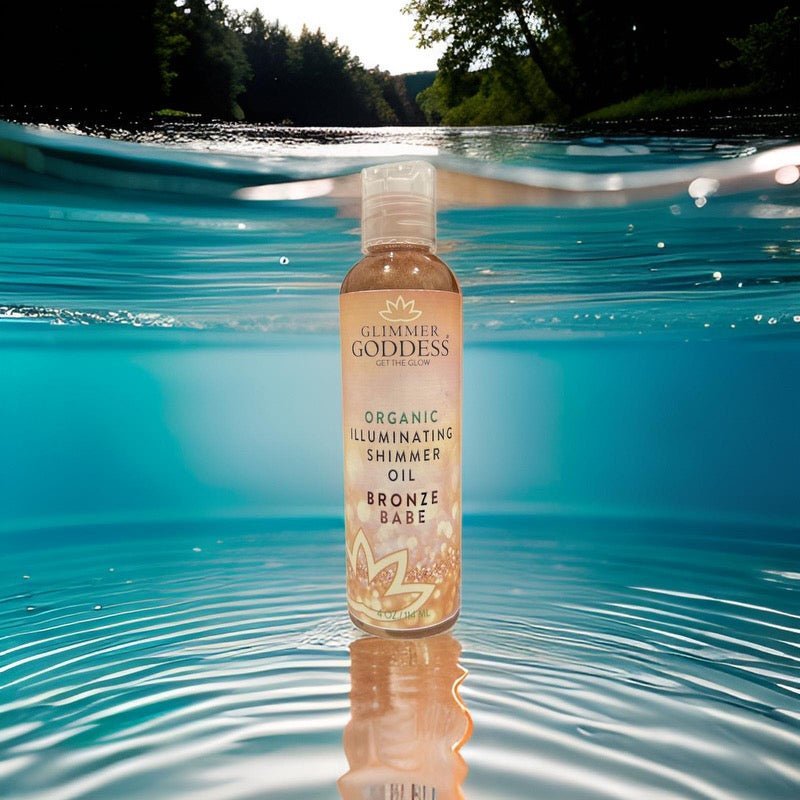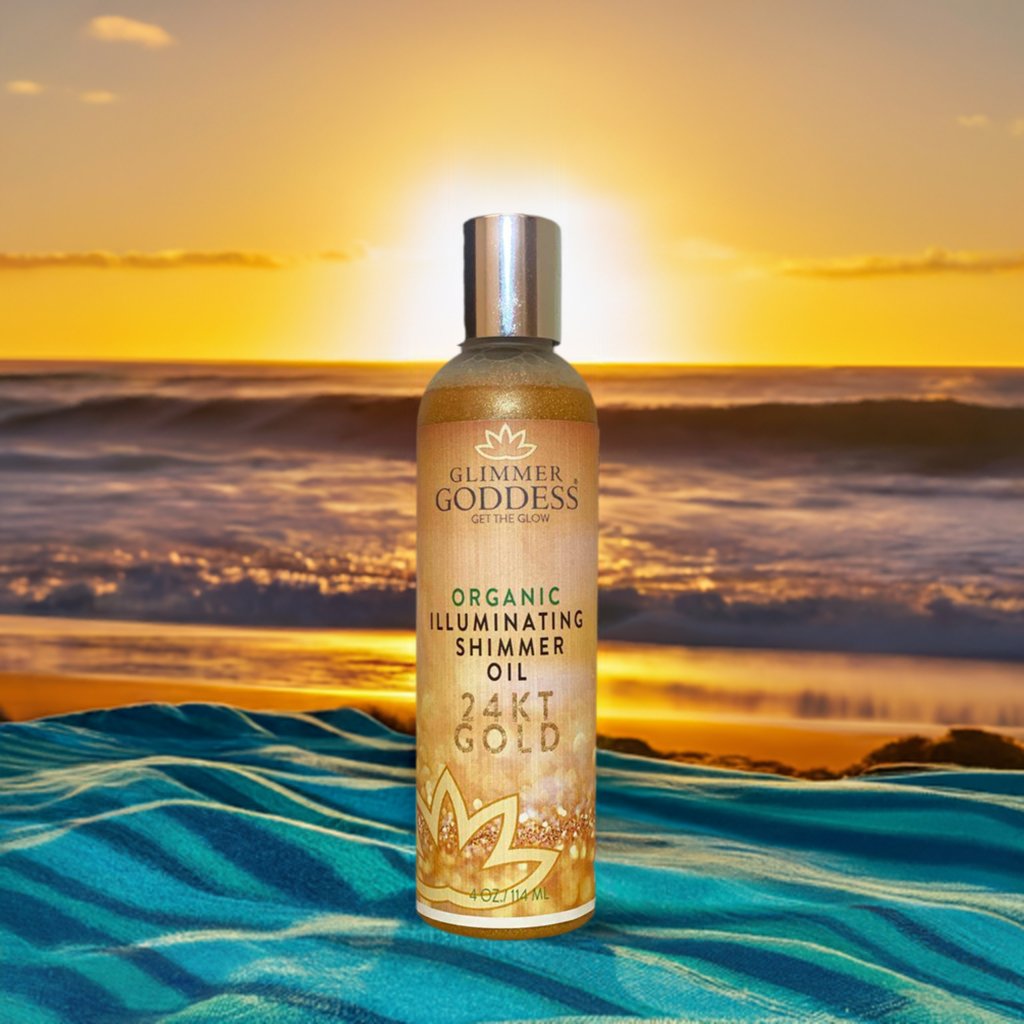
Illuminating Radiance: Unveil Your Goddess Glow with Organic Shimmer Body & Face Oils
Unlock the beauty of your olive complexion with our guide exploring its unique characteristics and makeup techniques. From the best foundation shades to skincare essentials tailored for olive skin, discover how to embrace your natural glow and achieve a radiant appearance.
Discovering the Beauty of Olive Complexion
What is an Olive Complexion?
An olive complexion is a skin tone that is characterized by a warm, golden-brown or slightly greenish-brown hue. This type of complexion is often associated with individuals of Mediterranean, Middle Eastern, or Latin American descent, as it is a common skin tone in those regions.
Olive skin is a unique and captivating blend of warm undertones, which can range from a subtle golden glow to a more pronounced olive-green tint. Unlike fair or dark skin tones, olive complexions possess a certain depth and richness that often makes them appear timeless and effortlessly beautiful.
- Olive skin is not to be confused with a tan, as it is a natural skin tone that can be present year-round, not just during the summer months.
- The olive undertone is caused by a higher concentration of melanin, the pigment that gives skin its color, in the skin's epidermis.
- Olive complexions can vary in intensity, with some individuals having a more pronounced olive hue, while others may have a more subtle, golden-brown appearance.
How Does Olive Skin Differ from Other Skin Tones?
Olive skin is distinct from other skin tones in several ways, including its undertones, its ability to tan, and its overall appearance.
Olive skin is characterized by warm, golden-brown or greenish-brown undertones, which set it apart from cooler-toned skin types like fair or pale skin, or warmer-toned skin types like deep, rich complexions.
- Olive skin can easily transition between a more golden or a more greenish hue, depending on factors such as sun exposure, diet, and overall skin health.
- Unlike fair skin, which can be prone to redness and flushing, olive skin often has a more even and luminous appearance.
- Olive skin tends to tan more easily and evenly than other skin tones, and it often retains a healthy, sun-kissed glow even after the summer months have passed.
Why is Olive Skin Often Considered Versatile?
Olive skin is often praised for its versatility, as it can accommodate a wide range of fashion and beauty choices, from bold, vibrant colors to more muted, neutral tones.
Olive complexions have a unique ability to seamlessly complement a variety of colors, making it easy for individuals with this skin tone to experiment with different makeup, clothing, and accessory options.
- Olive skin can effortlessly pull off both warm and cool-toned colors, allowing for greater flexibility in personal style and expression.
- Many makeup shades, from rich, earthy tones to vibrant, jewel-toned hues, tend to flatter olive skin, creating a stunning and harmonious look.
- Olive skin also has the ability to adapt to different lighting conditions, maintaining a natural, radiant glow that can be further accentuated with the right makeup application.
Embracing the beauty of olive complexion is not just about appreciating its unique characteristics, but also about celebrating the diversity and richness of human skin tones. By recognizing the versatility and allure of olive skin, we can challenge societal beauty standards and promote a more inclusive and empowering approach to self-expression and personal style.
The Ultimate Olive Skin Makeup Guide: Flawless Complexion, Radiant Glow
What Foundation Shades Work Best for Olive Skin?
If you have an olive skin tone, finding the perfect foundation can be a bit tricky. Many mainstream foundation lines cater to fair or dark skin tones, leaving those with olive complexions in the middle. But fear not! With a little know-how, you can find the right foundation to flatter your beautiful, unique skin.
Determining Your Undertone
- Olive skin tones often have a mix of warm and cool undertones, making it harder to find an exact match.
- To determine your undertone, look at the veins on the inside of your wrist. If they appear more green or olive-toned, you have a warm undertone.
- If your veins look more blue or purple, you have a cool undertone. Those with a true olive skin tone usually have a balanced mix of warm and cool.
Choosing the Right Foundation Shade
- When selecting a foundation, opt for shades that have a yellow or olive base rather than pink or red.
- Avoid foundations that are too light or too dark - they can make your skin look unnatural. Instead, look for a shade that seamlessly blends into your neck.
- Consider a liquid or cream foundation, which can provide a more natural, skin-like finish. Powders may sometimes appear too matte or mask-like on olive complexions.
- Lastly, don't be afraid to mix and match shades to get the perfect custom blend for your skin.
With a little trial and error, you can find the foundation that brings out the best in your olive-toned complexion. The key is to focus on the undertone and texture rather than just the surface color.
Which Blush Colors Complement Olive Complexions?
Olive skin tones are incredibly versatile when it comes to blush. From warm, earthy tones to soft pinks and peaches, there are plenty of shades that can enhance your natural glow.
Warm-Toned Blushes
- Olive skin often has warm undertones, so choose blushes with a touch of bronze, terracotta, or apricot.
- These rich, earthy hues can add a healthy, sunkissed flush to your cheeks.
- Some great warm-toned blush options include burnt orange, coral, and cinnamon.
Cool-Toned Blushes
- If you have more cool undertones in your olive skin, soft pinks and plums can be incredibly flattering.
- These cooler shades create a more subtle, delicate look on the cheeks.
- Experiment with rosy pinks, mauve, and even plum-toned blushes.
Luminous Finishes
- Regardless of the color, opt for blushes with a satin or luminous finish.
- Matte blushes can sometimes appear flat or dull on olive complexions.
- The added glow from a luminous blush will make your skin look healthier and more radiant.
The beauty of olive skin is its versatility. Don't be afraid to play with a variety of blush colors and finishes until you find the perfect complement to your unique complexion.
How to Choose Eyeshadow, Lipstick, and Highlighter for Olive Skin?
Olive skin tones are the chameleons of the makeup world - they can pull off a wide range of eye, lip, and highlighter shades. The key is to choose colors that enhance your natural features and bring out the warmth in your complexion.
Eyeshadow Palettes
- Warm, earthy eyeshadow tones like bronze, olive, and terracotta are incredibly flattering on olive skin.
- Cooler shades like smoky grays, deep plums, and navy blues can also create a striking, sultry eye look.
- Play with a combination of matte and shimmer finishes for depth and dimension.
Lipstick Shades
- Olive skin tones can pull off a wide range of lipstick shades, from bold reds to soft nudes.
- For a more natural look, opt for warm-toned nudes, peaches, or coral shades.
- Deeper, richer hues like burgundy, plum, or brick red can also be incredibly flattering.
- Don't be afraid to experiment with different finishes, from creamy mattes to glossy shimmers.
Highlighter Picks
- Olive skin often has a natural glow, so you'll want to choose highlighters that enhance that radiance.
- Go for champagne, gold, or bronze-toned highlighters that will seamlessly blend into your complexion.
- Avoid anything too stark white or icy, as it can appear unnatural on olive skin.
- Apply the highlighter to the high points of your face for a subtle, healthy-looking sheen.
With the right eyeshadow, lipstick, and highlighter, you can create a flawless, tailored makeup look that celebrates the natural beauty of your olive complexion.
The beauty of olive skin lies in its versatility - you can pull off a wide range of makeup shades and finishes. By focusing on colors that complement your warm undertones and enhance your natural glow, you'll be able to create stunning, radiant looks that make you feel confident and beautiful in your own skin.
The Essential Guide to Olive Skin Care
What are the Key Skincare Ingredients for Olive Skin?
Olive skin, with its warm golden undertones, requires a tailored approach to achieve a healthy, glowing complexion. Understanding the unique needs of olive skin is the first step in curating an effective skincare routine.
The key skincare ingredients that work wonders for olive skin include:
- Vitamin C - This potent antioxidant helps to brighten the skin and even out discoloration, providing a radiant and luminous complexion.
- Niacinamide - Also known as vitamin B3, niacinamide is a powerhouse ingredient that helps to minimize the appearance of pores, regulate oil production, and improve the skin's barrier function.
- Retinol - A form of vitamin A, retinol is a game-changer for olive skin. It can address concerns like fine lines, wrinkles, and uneven texture, revealing a smoother, more youthful-looking complexion.
- Hyaluronic Acid - This humectant ingredient helps to deeply hydrate the skin, plumping up fine lines and locking in moisture for a dewy, healthy glow.
- Ceramides - These lipids are essential for maintaining the skin's protective barrier, preventing moisture loss and keeping the skin supple and resilient.
By incorporating these key ingredients into your skincare routine, you can effectively address the unique needs of olive skin, promoting a radiant, even-toned, and healthy complexion.
How to Protect Olive Skin from Sun Damage?
Olive skin, while naturally more resilient to sun exposure, is still susceptible to the damaging effects of UV radiation. Proper sun protection is crucial to prevent premature aging, hyperpigmentation, and other skin concerns.
To protect olive skin from sun damage, consider the following:
- Use a broad-spectrum sunscreen with an SPF of 30 or higher. Look for formulas that are non-comedogenic (won't clog pores) and contain antioxidants like vitamin C or green tea to provide additional protection.
- Seek shade whenever possible, especially during the peak hours of the day (between 10 am and 4 pm).
- Wear protective clothing, such as wide-brimmed hats, long-sleeved shirts, and sunglasses, to cover vulnerable areas of the skin.
- Avoid tanning beds and prolonged sun exposure, as they can accelerate skin aging and increase the risk of skin cancer.
- Exfoliate regularly to remove dead skin cells and allow your sunscreen to penetrate more effectively.
By following these sun-smart practices, you can safeguard your olive skin from the damaging effects of UV exposure, maintaining a youthful, radiant complexion for years to come.
What are the Best Moisturizers and Treatments for Olive Skin?
Maintaining proper hydration and addressing specific skin concerns are essential for keeping olive skin healthy and glowing. Choosing the right moisturizers and treatments can make all the difference.
Here are some of the best moisturizers and treatments for olive skin:
- Hydrating Serums - Look for serums containing hyaluronic acid, glycerin, or aloe vera to deeply hydrate the skin and lock in moisture.
- Oil-Based Moisturizers - Olive, argan, or jojoba oil-based moisturizers can provide nourishing, non-greasy hydration, perfect for olive skin types.
- Brightening Masks - Clay or sheet masks infused with vitamin C, licorice root, or kojic acid can help to even out skin tone and address hyperpigmentation.
- Retinol Creams - Gradual introduction of retinol-based creams can improve skin texture, reduce the appearance of fine lines and wrinkles, and promote a more youthful complexion.
- Gentle Exfoliators - Using a weekly physical or chemical exfoliant, such as a sugar scrub or glycolic acid peel, can slough off dead skin cells and reveal a brighter, more radiant glow.
By incorporating these nourishing moisturizers and targeted treatments into your olive skin care routine, you can maintain a healthy, balanced, and luminous complexion that radiates confidence.
As a creative writer with a deep understanding of olive skin, I'm excited to share these insights and help you curate a personalized skincare regimen that enhances the natural beauty of your complexion. Remember, taking care of your skin is an act of self-love, and with the right products and practices, you can achieve a complexion that truly reflects your inner radiance.
Illuminating Radiance: Unveil Your Goddess Glow with Organic Shimmer Body & Face Oils
Illuminating Shimmer Body & Face Oils - Organic Radiant Glow & Hydration
Transform your skin with our organic illuminating body oils! Made from all natural, organic ingredients and infused with essential oils, they provide deep hydration and a subtle luminous glow. Choose from 5 sexy colors, including 24K gold and diamond-inspired shades. Evoke your inner Goddess with our Glimmer Goddess® formula. Vegan friendly and cruelty free.
Unlock the Secrets of Radiant, Glowing Skin with Our Illuminating Shimmer Oils
- Formulated with a blend of nourishing organic oils, including jojoba, sweet almond, and grapeseed, to deeply hydrate and nourish your skin
- Infused with a touch of iridescent shimmer to create a radiant, dewy glow that catches the light and enhances your natural beauty
- Available in a range of captivating shades, from warm golden tones to cool, diamond-inspired hues, to complement any skin tone
- Thoughtfully crafted with clean, vegan-friendly ingredients that are gentle on your skin and the environment
- Cruelty-free and never tested on animals, so you can feel good about using our products
Q&A
What defines an olive complexion?
An olive complexion is characterized by a warm, golden-brown or slightly greenish-brown hue, often seen in individuals of Mediterranean, Middle Eastern, or Latin American descent.
What foundation shades work best for olive skin?
Opt for foundation shades with a yellow or olive base. Avoid pink or red undertones, and look for a liquid or cream formula that blends seamlessly into your neck.
Which blush colors are flattering for olive complexions?
Warm-toned blushes like bronze or terracotta, and cool-toned shades like soft pinks and plums are great options. Choose luminous finishes for a healthy glow.
How can I protect my olive skin from sun damage?
Use a broad-spectrum sunscreen with SPF 30 or higher, seek shade during peak sun hours, wear protective clothing, and exfoliate regularly for effective sun protection.
What are the key skincare ingredients for olive skin?
Key ingredients include Vitamin C for brightening, Niacinamide for minimizing pores, Retinol for texture improvement, Hyaluronic Acid for hydration, and Ceramides for barrier protection.
Embracing your olive complexion means celebrating its unique beauty and versatility. By choosing the right makeup shades and skincare products, you can enhance your natural glow and promote a vibrant, healthy look. Remember, caring for your skin is an act of self-love that empowers your confidence and individuality.




